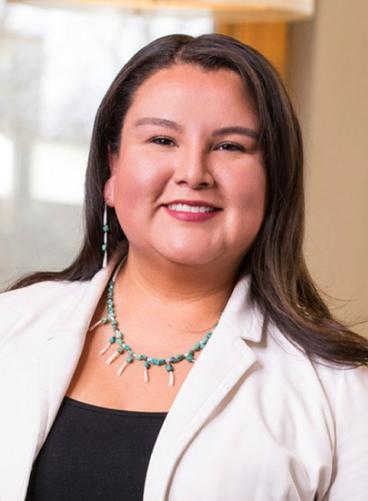Jayme Davis is passionate about strengthening Native American nations, and is using her studies at the Humphrey School of Public Affairs to improve her skills as a leader.
As an Anishinaabe from the Turtle Mountain Band, and descendent of the Hunkpapa Lakota from Standing Rock, Davis has spent much of her career working on Native nation policy and governance issues.
She’s currently the program director at Native Governance Center, a Native American-led nonprofit organization based in St. Paul. It supports the 23 Native nations that share geography with Minnesota, North Dakota, and South Dakota by providing leadership development and governance resources.
She’s also a student in the Humphrey School’s mid-career Master of Public Affairs program, and plans to finish her degree in 2020.
Davis says she “fell in love” with public policy while working for U.S. Sen. Kent Conrad of North Dakota in Washington D.C. several years ago, where she gained insight into the policy development process and “the strategic vision that’s required for creating good governance.”
Davis decided to take those lessons back to North Dakota and apply them toward strengthening Native nations. Once back home, she participated in a leadership development program offered by Native Governance Center, which she calls life changing.
The Native Nation Rebuilders program focuses on equipping Native American leaders with the skills they need to improve their communities and strengthen tribal sovereignty. Now as program director at the Governance Center, she leads the Native Nation Rebuilders program, which just had its 10-year anniversary.
We asked Davis to tell us more about her Humphrey School experience.
What attracted you to the MPA program at the Humphrey School?
I really enjoyed working on public policy during my time in Washington D.C. I liked the structure and attention to detail that this work required. I wanted to learn more about public policy, so I researched some schools, and saw the Humphrey School near the top of the rankings. Once I moved to the Twin Cities for my position with Native Governance Center, I knew it was only a matter of time before I decided to apply. The MPA program particularly interested me, because it provides everything I need to move forward in my profession.
How does your MPA experience apply to your current work and your personal growth as a leader?
My MPA education has immediately benefited my work. I love that the program directly relates to my professional focus on tribal governance, leadership, and policy. My involvement in the MPA program cohort has also pushed me to lead by example. During the past six months, I’ve developed a greater understanding of my own identity, my leadership style, and the ways in which I can best contribute to the community.
The MPA curriculum pushes me to think outside of the box every day. We sometimes have difficult conversations, but it’s through these moments that I’ve learned the most. The program brings important issues to life and encourages students to analyze and digest them in a space where everyone’s voice matters. The best part of the program is the chance to have diverse and impactful conversations during each session.
How will your master's degree help you in the future?
I’m confident that my education will take me far. My MPA degree will help me continue to strengthen my work on issues related to tribal governance, policy, and leadership. In just the past six months alone, I’ve already implemented many of the strategies that I’ve learned. Some examples are:
- Using active listening to create space for everyone at the table. It’s something I work on every day, personally and professionally.
- Learning about proper research techniques. It's through this class that I came across some great resources on Native American leadership that I have used to design our youth leadership program.
- Critical thinking skills that come with going back to school. You sharpen your view on everything, questioning issues and topics from different angles and perspectives, and having powerful conversations that can change how you view the world or even yourself.
What type of person would benefit from the MPA program here at the Humphrey School?
Anyone wanting to level up in their field would benefit from this program. It’s a challenge, but it’s the best kind of challenge. It’s one that will help you become a better person for yourself, your family, and your community.


